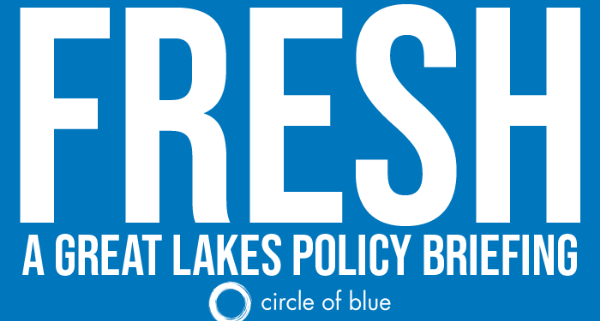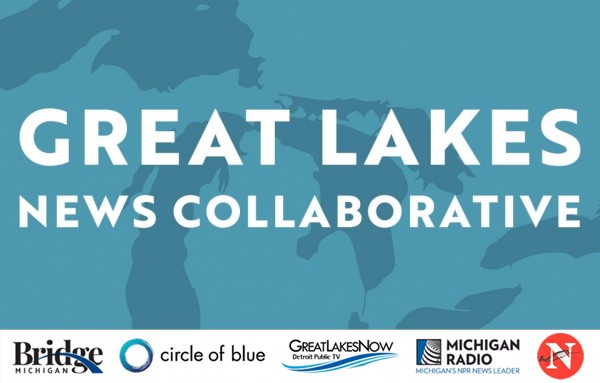Fresh, May 14, 2024: In Minnesota, Largest U.S. Potato Producer Sues White Earth Nation Over Water Permit Dispute
May 14, 2024
Fresh is a biweekly newsletter from Circle of Blue that unpacks the biggest international, state, and local policy news stories facing the Great Lakes region today. Sign up for Fresh: A Great Lakes Policy Briefing, straight to your inbox, every other Tuesday.
— Christian Thorsberg, Interim Fresh Editor
This Week’s Watersheds
- A new report from a Great Lakes advocacy organization urges leaders to strengthen an agreement that governs water diversions from the Great Lakes.
- A Lake Erie beach in Pennsylvania will be the testing site this summer for a new technology that aims to convert waves into renewable energy.
- In northern Minnesota, the White Earth Nation is being sued for issuing water permits that farmers say are outside the tribe’s jurisdiction.
- On the Iowa-Wisconsin border, a power line may soon be built on a parcel of formerly protected land on the Mississippi River following a controversial land swap.
The bipartisan Great Lakes Restoration Initiative Act, which extends a popular program that pays for ecosystem restoration, has been approved by a Senate committee.
“The creation of the Great Lakes Restoration Initiative is one of the most important actions of my legislative career…This bill will ensure the stability and future of the program as we address new emerging threats to our Great Lakes and waters.” — Sen. Debbie Stabenow (D-Michigan).
The U.S. Senate Committee on Environment and Public Works approved the extension of the Great Lakes Restoration Initiative (GLRI) — a bipartisan bill that supports projects to protect, clean, connect, and research the region’s freshwater bodies — through 2031. And beginning in 2027, the initiative’s yearly funding will increase from $475 million to $500 million.
First authored in 2010, the bill is sponsored by 14 senators and 32 representatives. Since its establishment, the GLRI has funded projects to slow the spread of invasive carp, restore coastlines, promote watershed connectivity, and clean up polluted ecosystems that have been identified as “areas of concern.”
Fresh from the Great Lakes News Collaborative
- As storms intensify, ghost streams and wetlands haunt homes and businesses built over them — Michigan Public
- Great Lakes Moment: Detroit River’s important role in lake whitefish — Great Lakes Now
- As cleanup efforts target Michigan lakes, debate follows about who benefits — Bridge Michigan
- Enbridge tells staff to vote against more thorough emissions reporting — The Narwhal
Bridge Michigan, Circle of Blue, Great Lakes Now at Detroit Public Television, Michigan Public and The Narwhal work together to report on the most pressing threats to the Great Lakes region’s water. This independent journalism is supported by the Charles Stewart Mott Foundation. Find all the work here.
Water Permit Dispute in Minnesota
R.D. Offutt Farms, the country’s largest potato grower, has filed a civil lawsuit against the White Earth Nation, claiming that the tribe does not have the authority to control water permitting for non-Indigenous farmers, Minnesota Public Radio reports.
Beginning in May 2023, the White Earth Division of Natural Resources began requiring farmers with irrigation wells on the reservation or within five miles from its boundary to apply for water permits. According to Red River Farm Network, these permits are 30 times more expensive than standard Minnesota Department of Natural Resources fees.
R.D. Offutt Farms, which is based in Fargo, North Dakota, maintains that its water withdrawals “have not had, and will not have, a direct effect on the political security, economic security, or health and welfare of the White Earth Band.”
The lawsuit comes as the White Earth Nation continues to push for the return of forest lands, currently owned by the state and taken years ago without the tribe’s permission, to White Earth control.
In context: Minnesota Tribe Sets Enforceable Rules to Safeguard Wild Rice and Water Supply
In the News
FLOW: A new report released by For Love Of Water (FLOW), a Great Lakes advocacy organization, urges the region’s leaders to strengthen the Great Lakes Compact, an agreement signed with bipartisan support 15 years ago that restricts water diversions from the lakes, the Michigan Advance reports. FLOW advocates contend that the compact wrongly treats Great Lakes water as an economic commodity: “The commercialization of water sanctioned by the Compact is both a short and long-term threat. Water extraction for bottling and sale threatens sensitive local ecosystems where groundwater pumping impacts wetlands and stream levels,” an excerpt of the report reads.
Mississippi River Land Swap: A proposed 102-mile high-voltage power line, which will extend from Iowa into Wisconsin, is facing opposition from conservation groups for a mile-long section that will cross the Upper Mississippi River National Wildlife and Fish Refuge near the state border. On the shores of the Mississippi River, the area where the line is planned to extend would likely disrupt the refuge’s fish, wildlife, and migratory birds, the Associated Press reports. A preliminary injunction that halted a land swap between the U.S. Fish and Wildlife Service and ITC Midwest was invalidated last week. Construction of the line could begin immediately.
Looking Ahead
Breakwave Energy: The renewable energy company has announced that it will be testing its new technology — which converts waves into energy — on the shores of Lake Erie, WKBN reports. At Shorewood Beach in Erie County, Pennsylvania, the company will assess the efficiency of its wave energy converters and monitor the local environmental impacts of its system. “This project underscores our commitment to developing renewable energy solutions that are both effective and environmentally friendly,” Breakwave said in a statement.
Upcoming Events
May 12 – 16 — International Conference on Aquatic Invasive Species — learn more
May 12 – 16 — 47th Larval Fish Conference (Early Life History Section of the American Fisheries Society) — learn more
May 13 – 16 — Grand Rapids 25th River Rally — learn more
May 15 – 17 — Great Lakes and St. Lawrence Cities Initiative 2024 Annual Meeting — learn more
May 20 – 24 — IAGLR’s 67th Annual Conference on Great Lakes Research — learn more
June 2 – 6 — Society for Freshwater Science Annual Meeting — learn more
Other News
Thames River Catfish: Scientists have found evidence that the massive flathead catfish, native to the southeastern United States, has made its way into warming Ontario waterways, CBC reports.
Voyage Information System: Vessel traffic on the St. Lawrence Seaway and Great Lakes will be partly monitored and managed by a new AI-powered system from Global Spatial Technology Solutions, the Smart Maritime Network reports.
Correction: An earlier version of this digest misstated facts about the Great Lakes Compact. The agreement does not facilitate bottled water shipments to Asia. Preventing those sorts of large-scale diversions out of the basin is why the compact was initially signed.
Christian Thorsberg is an environmental writer from Chicago. He is passionate about climate and cultural phenomena that often appear slow or invisible, and he examines these themes in his journalism, poetry, and fiction.









Leave a Reply
Want to join the discussion?Feel free to contribute!